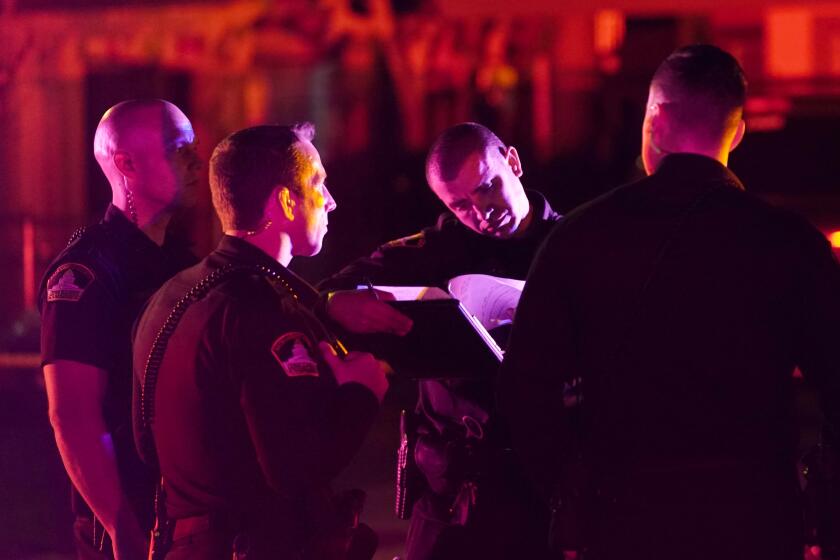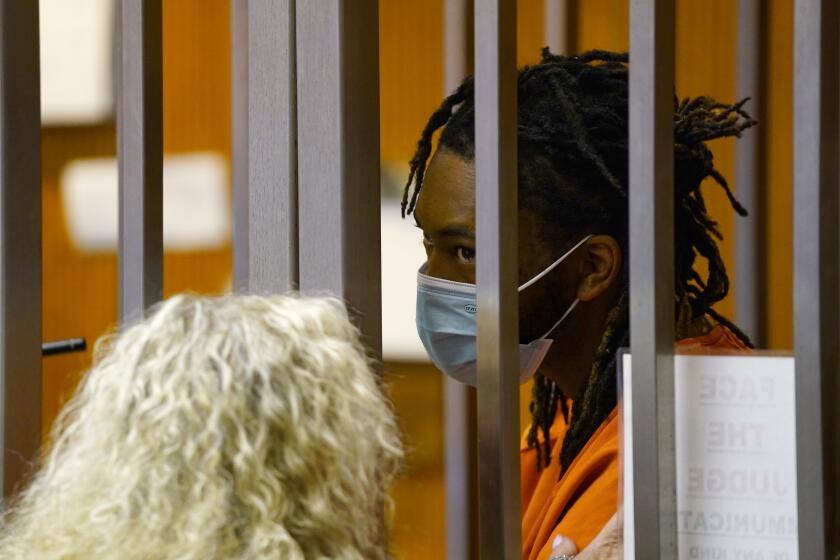Column: Sacramento shooting suspects had a history of domestic violence. It’s a warning sign

- Share via
SACRAMENTO — The two brothers suspected of involvement in the recent deadly shooting in Sacramento, Dandrae and Smiley Martin, share something in common besides blood.
They both beat women — a warning sign for gun violence, according to researchers.
In 7 of 10 mass shootings, the perpetrator (let’s be real, usually a man) either had a history of domestic violence or was targeting someone he had a relationship with. About 1 in 4 homicides in the United States are related to domestic violence, and too often include bystanders.
Those statistics come from the new Johns Hopkins Center for Gun Violence Solutions, and from Lisa Geller, a researcher who has studied the issue for years.
She told me she wouldn’t be shocked if all the shooters in the Sacramento attack (police think there may be at least five) were found to have domestic violence in their backgrounds. Late Tuesday, her prediction started to play out — police announced they were searching for a third shooting suspect, Mtula Payton, adding that he was wanted for felony domestic violence and gun charges.
Robert Spitzer, a recently retired professor from the State University of New York in Cortland and the author of seven books on gun violence, told me the connection between gun violence and domestic violence was “clear as a bell, really.”
Examples are depressingly easy to find.
Last year, a man who murdered nine co-workers at a Santa Clara County rail yard had been accused by a former girlfriend of abusive behavior and sexual assault. In one of the most horrific mass shootings in U.S. history, when a man killed 49 people at the Pulse nightclub in Orlando in 2016, media reported he beat and strangled his former wife.
And just last month in Sacramento, a man with a domestic violence restraining order against him shot and killed his three daughters and a visitation monitor before killing himself.
There are many more examples, but I’ll leave it at that.
Woman told court her boyfriend was dangerous before he killed 4 during a supervised visit with their children at a Sacramento-area church.
One solution that Geller advocates? Take violence against women seriously.
Right now, we downplay it at our own peril, still bound by outdated mores that — even if we don’t say it out loud — violence against an intimate partner is a different crime than violence against a stranger. The heartbreaking, infuriating, unacceptable fact is that we don’t treat crimes against women as seriously as those against men, and especially if they happen in private spaces.
There are some concrete reasons why it’s hard to investigate and prosecute domestic violence. Women, the predominant victims, can be too scared or vulnerable to testify, or worried about the safety or well-being of children. They can imagine themselves as in love. They can be financially precarious and socially isolated without options for jobs or housing — conditions abusers often cultivate. They can be worried about immigration status, or previous arrests of their own.
Or they can be savvy enough to know that their abuser will probably be back on the street soon enough.
I’m going to add racism and bias into that mix as well, and give you the details of what the Martin brothers did — because too often, what we label as domestic violence is really about sex trafficking, and the way Black and brown women and girls are viewed and valued. Despite the current conservative panic of packs of roving Democrats snatching children, sex trafficking is often a lone man preying on women in his orbit, often in communities of color.
Dandrae Martin was charged with nine counts for an assault on a woman I’ll call T.M.
According to court records, Martin and T.M. were staying in a Phoenix hotel with their 1-month-old and 2-year-old babies when Martin beat T.M. for more than an hour because she refused to prostitute herself through ads Martin had set up on the now-closed internet site Backpage.
Martin “hit the victim all over her body” and face, the records show, before stepping on her neck twice, stomping on her hand and attempting to choke her twice. He also allegedly urinated on her — all this happening with the kids present — according to a grand jury indictment. T.M. escaped the room and found help.
Martin struck a plea deal that dismissed all but one felony count of aggravated assault for impeding breathing and eventually was given four years’ probation, despite the fact that T.M. had a restraining order against him from a California court.
Martin didn’t stay out of trouble and “absconded” from probation after his release, never fulfilling any of its terms. In July 2018, he attacked his mother. I’ll also leave her name out of this.
She told police that she caught Martin going through her purse, and when she tried to stop him, he pushed her, then threw her to the ground and threw a rock through the window when she managed to lock him out. That case was downgraded to a misdemeanor, and he was once again given probation. And again was released.
It wasn’t until police picked him up on a drug paraphernalia charge in 2019 that his probation was finally revoked. He went to prison in Arizona on a 2 ½-year term beginning that April, with credits for 202 days served.
Meanwhile, Smiley Martin, Dandrae’s older brother by a year, was keeping California courts busy.
In May 2017, Smiley Martin was arrested for attacking a woman I’ll identify as R. Doe — whom he’d previously been accused of pimping. He found R. Doe staying at his stepmother’s house in Sacramento, and according to a detective’s testimony, forced his way into the house and beat her until her face was so bloody a witness couldn’t see R. Doe’s eyes. He then put her in his car and drove to a nearby park, where he struck her in the face and arm with his belt.
While incarcerated awaiting trial, he was recorded on jail calls instructing R. Doe how to testify. On the stand, she denied his involvement and said she didn’t recall the injuries, and was dating Smiley Martin. He pleaded his case down and was sentenced to five years, which was doubled to 10 years because of a prior “strike” offense of robbery of a Walmart in 2013. (He also has a 2013 gun charge, a 2011 burglary conviction and a juvenile record that landed him on the list for those not allowed to legally own firearms.) He served less than five years in the R. Doe case due to credits earned for time served before his conviction and while in prison.
If those crimes shock and disturb you, we need to confront how the legal system needs to change — not just to help the victims of abusers, but to ensure those men don’t escalate their violence to the public sphere.
First, we need to be clear it’s not just a liberal California problem. Proposition 57 did not cause it any more than progressive district attorneys like George Gascón or Chesa Boudin did — despite the current flashy headlines driven by some conservative politicians running for office on a tough-on-crime platform. This is not a soft-on-crime problem for the Golden State.
Dandrae Martin’s domestic violence conviction took place in Maricopa County in Arizona, home of former ultraconservative Sheriff Joe Arpaio and far-right politics including the so-called election “audit” meant to restore Donald Trump to office. It’s a conservative place, and still the attack was classified as a “non dangerous, non repetitive” offense, making it eligible for probation.
This is a problem of not believing women when they tell us about dangerous men and of falling “back into the realm of the old he said/she said trope,” as Spitzer puts it.
Sacramento police say there were at least five shooters but are not providing details if any suspects are still at large.
Domestic violence is “an area where it’s hard to make a case and where legal remedies are still incomplete,” Spitzer says. Whether it be a liberal state or a conservative one, we are soft on this crime. We still treat domestic violence — even when it’s really sex trafficking — as an offense where women must be complicit if not somehow guilty of their own victimization.
Secondly, when men like the Martin brothers are charged or convicted of these crimes, we do a lousy job making sure they don’t have guns — legal or otherwise — when they return to the street. Right now, it’s basically an honor system for men with no honor. Usually, it’s little more than criminals and abusers filling out forms acknowledging they are not allowed to have guns and checking a box affirming they do not possess any. Sometimes there’s a database check to see if there are any legal firearms registered to the offender.
That was the case for Smiley Martin — who had been arrested multiple times with illegal weapons. Courts records from January 2018 include a “prohibited persons report” that shows Smiley Martin had failed to fill out a required form disclosing any gun ownership.
That’s it. Feel like telling us if you have any guns? No? OK.
The Martin brothers were so confident in their ability to carry weapons without repercussion that they filmed themselves hours before the shooting waving guns around and posted it on social media.
When people are convicted of domestic violence or authorities issue restraining orders and red-flag orders — meant to take guns away from unstable people — why don’t we send law enforcement to take legal weapons and search for illegal ones in the homes and cars of perpetrators? Why is it not standard practice?
Let me help you out here. It’s true that our probation and parole departments, the ones most likely to conduct such searches, are seriously overwhelmed at the moment.
But we don’t prioritize confiscating weapons in domestic abuse cases because toxic masculinity is alive and kicking. The nearly 400 million guns in America remain enshrined in false politics of freedom and strength. But domestic violence is still a crime we look down on, or look away from. Especially when it happens to Black and brown women.
If we want to curb gun violence, we can start by believing women when they warn us about predators, and then by making sure the predators don’t possess incredibly lethal weapons.
Or we can continue to wait until those men shoot into a crowd and wonder yet again how such a tragedy could happen with no warning.
More to Read
Updates
9:05 a.m. April 13, 2022: This column has been updated to note that Sacramento police are seeking a third suspect, Mtula Payton, in the shooting.
Sign up for Essential California
The most important California stories and recommendations in your inbox every morning.
You may occasionally receive promotional content from the Los Angeles Times.













